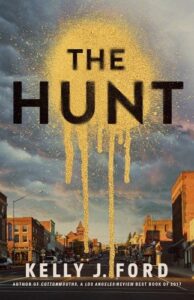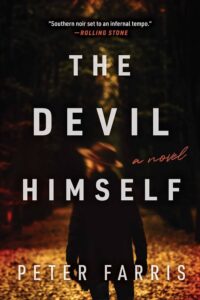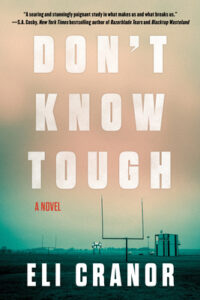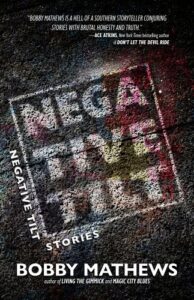
When I was young, I spent Friday afternoons at my maternal grandmother’s house with the pages of supermarket tabloids spread out in front of me on the living room floor. You know the ones: The National Enquirer, The Weekly World News, The Weekly Globe, and others of that ilk. Some had stories just unbelievable enough to feel true to a child of the Christ-haunted South, where we felt the supernatural lived with us cheek-by-jowl, close enough to smell the sharp tang of sweat mixed with Aqua Velva on a preacher’s neck as he spoke in tongues on a Sunday morning. With those pages splayed out before me, I was subject to a slew of adult-oriented advertising. Virginia Slims cigarettes were often featured on the back cover of the tabloids along with the slogan “You’ve come a long way, baby!”
I remember that slogan often when I think about Southern fiction, and Southern noir and gothics in particular. For years, this kind of fiction was the bailiwick of mostly straight white writers. While there were always outliers like Truman Capote, the genre bent naturally toward heavyweights like William Faulkner, Flannery O’Connor, and Larry Brown. But in recent years, that’s changed for the better. While white men still dominate the genre, the modern Southern literary landscape is much more of a mirror to what the actual South looks like, with LGBTQ+ and BIPOC writers finally getting space to tell stories of marginalized characters to a rapt audience.
I remember sitting with S.A. Cosby at the Conference for the Book in Oxford, Mississippi in April 2023. We were at the hotel bar drinking brown liquor and telling tales of our similar dirt-poor upbringings — his in Virginia, mine in Alabama — and talking about the tradition of Southern crime writers. A tornado warning had forced organizers to cancel a planned Noir at the Bar reading event, and we were making the most of it. We talked about what makes his work so special. What it came down to, he said, is that “the South belongs to Black people, too.”
Of course that’s always been the case. But in the here and now the voices of marginalized writers have arrived with the gale force of a hurricane blowing up from the Gulf of Mexico, bringing winds and waves that are transfiguring the shoreline of Southern fiction right before our eyes. Cosby’s trifecta of masterworks—Blacktop Wasteland, Razorblade Tears, and All the Sinners Bleed—are as powerful as anything published in the crime genre since the turn of the century.
Here are some more crime and gothic writers reshaping the mythical South as we know it on the page and making it far more universally appealing to readers.

Jesmyn Ward
Might as well start off by talking about the elephant in the room. Jesmyn Ward is a National Book Award winner and recipient of a MacArthur “Genius” Fellowship, and every time she turns her keen eye toward her family’s native Mississippi—and particularly the Gulf Coast—it’s worth reading. While Salvage the Bones is the book that won the National Book Award, readers should check out Sing, Unburied, Sing first. It’s a modern masterpiece of Southern Gothic fiction, and one of its narrators—the ghost of Richie, who cannot accept or understand his death—haunts me still. Ward is a force of nature by herself, flattening readers with the power of her prose. If you’ve never read her, you are in for a treat.

Kelly J. Ford
Kelly Ford is not a household name. Not yet. But her three novels—Cottonmouths, Real Bad Things, and The Hunt—have all been lauded for their realistic, sensitive, and timely portrayal of LGBTQ+ characters in the Deep South. A writer with deep roots in her native Arkansas, Ford pens characters full of longing, heartache, and isolation and shows us that these themes are as universal to people of every gender and sexual orientation as you’d suspect. Cottonmouths, especially, is an incredibly passionate look at how accurate Faulkner’s words about the South were when he wrote “The past is never dead. It’s not even past.”

Peter Farris
Arguably one of the best writers of modern Southern fiction can’t seem to stay published in the United States. Farris, whose 2022 novel The Devil Himself should have marked him as a major player in crime fiction, is far more popular in Europe, where the strangeness that lies at the heart of so many Southern stories seems to be more accepted and even encouraged. If the grotesque is still a part of the Southern Gothic’s makeup, Farris’s mannequin-loving Leonard Moye will shake readers with his warped sense of love and loyalty, as well as his deep well of humanity.

Wanda M. Morris
Wanda Morris fooled me with her fantastic first novel, All Her Little Secrets. After its success, I thought she’d likely be writing twisty mainstream thrillers with some Southern ornamentation on the side. I’m so happy to have been wrong. Instead her second book, Anywhere You Run, immerses the reader into Jackson, Mississippi in 1964, when a Black woman murders the white man who raped her. With the murders of three civil rights activists weighing heavily to influence Violet’s mindset—and the novel’s plot—Morris leans into the Southern aspect of the crimes and chops at the virulent racism rooted in the time and place. Morris’s next book, What You Leave Behind, looks to be just as hauntingly Southern.

Eli Cranor
Eli Cranor’s 2022 debut novel, Don’t Know Tough, won the Edgar for best first novel as well as a finalist for the Anthony Award (and should have won it, too). One of the most striking things about Cranor’s debut was the voice of Billy Lowe, a talented running back for his Arkansas high school football team. Some readers took issue with Lowe’s point of view, considering it a ‘Black’ voice. However, as someone who played sports with poor kids across several different races, Lowe’s voice was an authentic depiction of a young man who was poor and desperate and isolated. It was a perfect inversion of expectations, especially when set against the characterization of his head coach.
I can tell you that writers like these have changed the way that I approach writing about the area I’ve called home for most of my life. If, as a popular T-shirt down here says, “Y’all means ALL,” then the stories of the modern South will continue to resonate with readers from all walks of life for years to come.
***





















